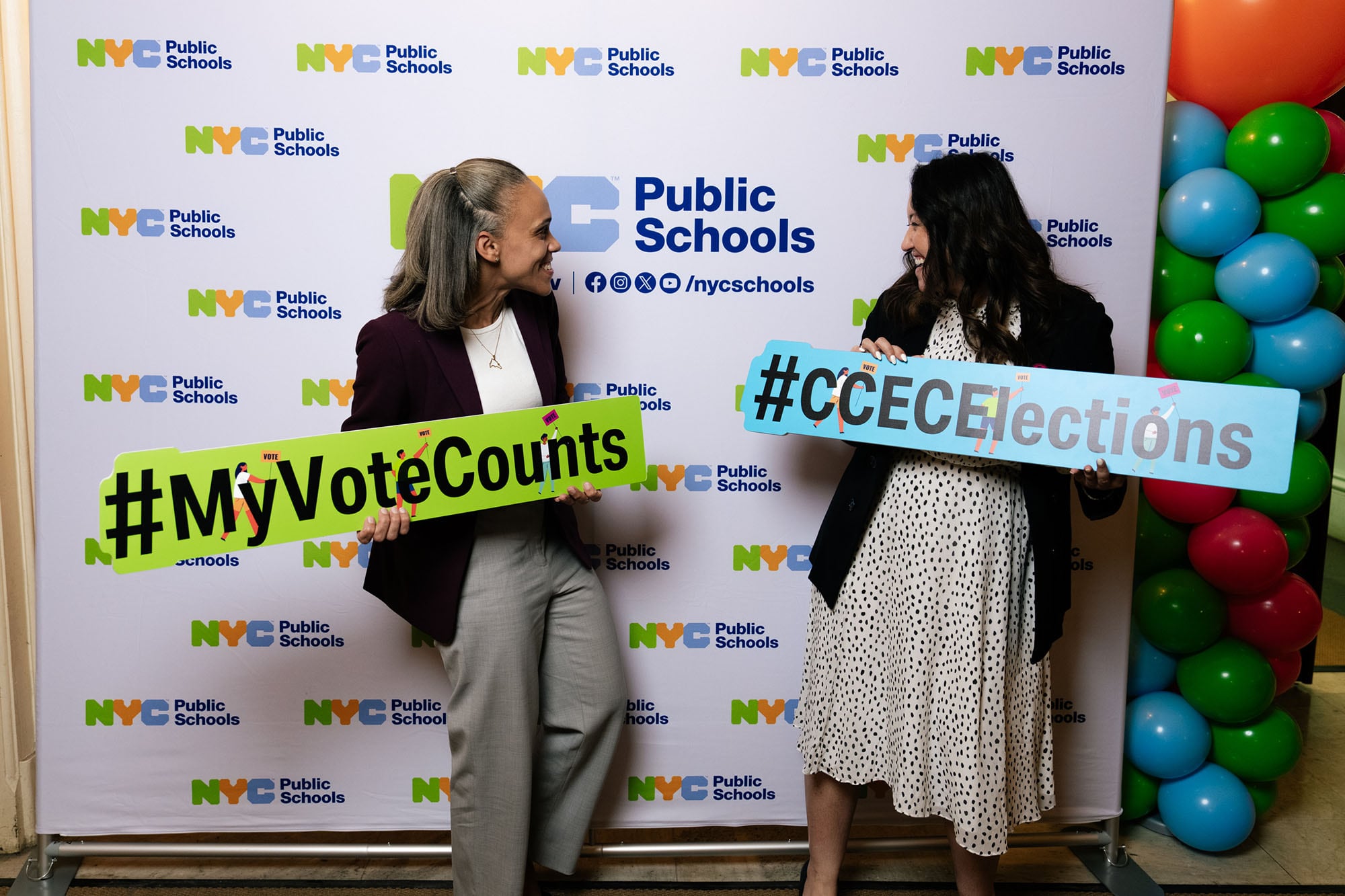Sign up for Chalkbeat New York’s free daily newsletter to get essential news about NYC’s public schools delivered to your inbox.
Parent leaders across the city are raising alarms about New York City’s local school council elections, citing “gross mismanagement” of the process by the Education Department.
At issue are Community Education Council races, which are held every two years to elect parent leaders in each of the city’s 32 local districts and four citywide councils representing English learners, students with disabilities, and high school families. Families vote online through their New York City Schools accounts, or NYCSA, through May 13.
The Education Department’s office of Family and Community Engagement, known as FACE, runs the elections which saw just 2% of voter turnout during each of the past two cycles. This will be the third election in which all parents with public school children can vote; previously, PTA leaders selected candidates.
The problems in this election cycle range from inconsistently listing candidates on ballots, with some appearing with their last names first and others in the reverse order, to larger problems that have interrupted voting or erased some votes entirely.
This year’s election cycle got off to a bumpy start. Hours after voting began April 25, Education Department officials took the system offline to fix “technical issues.” The system was down for about 11 hours.
In Manhattan’s District 1, which covers the Lower East Side and East Village, one parent vying for a council seat was left off the ballot. Voting had already been underway for a week, but FACE staffers told families who had already voted, that they would have to vote again.
Meanwhile, the Citywide Council for High Schools contends that FACE has not properly overseen candidate forums, “allowing various violations of the rules by candidates without interruption from the FACE representative on duty who was either passive or left prematurely.”
Three councils — District 1, District 20 in Brooklyn, and the high school council — have drafted resolutions calling for FACE to be overhauled or dismantled and urging local and state elected officials to intervene.
“The persistent and systemic failures in FACE’s administration of these elections undermines parent trust in the process and threatens to depress parent participation in school governance,” according to language from all three resolutions, which are advisory and are expected to be voted on this week.
An Education Department spokesperson did not respond to a request for comment about the resolutions. Officials said only that they are extending the deadline for voting — from 5 p.m. to 11:59 p.m. on May 13. They said state law prevents them from extending it further.
Community Education Councils’ main formal role is to approve boundaries that define geographic areas from which schools may draw students. They have little policymaking power, though they offer an important feedback mechanism from parents to Education Department officials. Some have taken up hot-button issues in recent years, from transgender students’ participation in sports to protecting students from immigration enforcement at school.
As some councils have waded into the culture wars, this year’s elections have garnered more interest from parents who previously had paid little attention to these democratic bodies.
Critics have raised concerns for years about the election process, often noting that participation is frequently dismal. In 2023, the city spent about $224 per voter, or nearly $4.3 million, to operate that election, department officials told parent leaders.
A Chalkbeat investigation after the last election highlighted numerous concerns as to how FACE conducted the process, including how the office was gripped internally by turmoil and factions, potentially affecting the turnout and its outcomes. City Comptroller Brad Lander proposed a series of reforms last November to improve outreach and set clearer campaign rules.
Fivel Rothberg, who worked as an outreach consultant supporting the education council elections until last month, said he is disappointed that the process remains so dysfunctional.
“FACE had two years, from 2023 to 2025, to organize a better election rollout,” Rothberg said. The Education Department’s “mismanagement of the [education council] elections is disheartening because there is so much possibility … for parental involvement in improving schools.”
Some District 1 families said they worry there is no easy fix for leaving a candidate off the ballot. Even as the Education Department extends the voting window, it’s unclear if every family who had already voted will cast another ballot.
City officials told parent leaders this week that 83 parents had voted prior to canceling and restarting the ballots, but they didn’t provide information on how many of those parents revoted, said Noah Harlan, the president of District 1’s council. He said he had “serious concerns about disenfranchisement” of the parents who votes were cancelled and did not have the same voting window as those in other districts after the vote restarted.
“It’s unpredictable where this will go because it’s so messy,” said Robert Murtfeld, a District 1 parent and former education council member. “Even if we extended the voting for a week, where’s the fairness?”
The dysfunctional elections process suggests the Education Department sees the councils as an afterthought, said Erika Kendall, president of the education council in Brooklyn’s District 17. But for her, the councils are an important conduit for parent voice and driving additional resources to the district. The council recently advocated for the city to open a local school geared toward students with reading challenges, she noted.
“The idea that we don’t have to be taken seriously, that we’re just kind of this burden that everybody tolerates, I find it very disrespectful especially considering the meaningful work that we can do,” Kendall said.
Alex Zimmerman is a reporter for Chalkbeat New York, covering NYC public schools. Contact Alex atazimmerman@chalkbeat.org.
Amy Zimmer is the bureau chief for Chalkbeat New York. Contact Amy atazimmer@chalkbeat.org.







